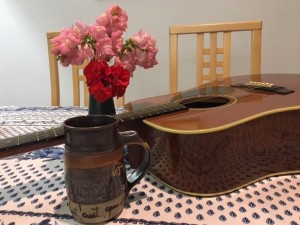éFirst published in The Catholic Times July 16, 2017 issue

PHOTO: Mary van Balen
And since the nature of goodness is to diffuse itself…the Father is the fountain-fullness of goodness. Ilia Delio
Yet access to safe drinkable water is a basic and universal human right, since it is essential to human survival and, as such, is a condition for the exercise of other human rights. Pope Francis
Standing Rock is everywhere. Chief Arvol Looking Horse
Water has been on my mind. As Ilia Delio, O.S.F. writes in Simply Bonaventure: An Introduction to His Life, Thought, and Writing, the 13th century saint whose feast we celebrate on July 15 referred to the first principle of the Godhead as the fountain-fullness of goodness. (Bonaventure referred to this self-diffusive Goodness as “Father,” not in a biological manner, but in the sense that God is generative, Delio explains.)
I first heard this phrase over fifteen years ago while attending a lecture by Delio. When she made time for questions, I was unable to formulate any but sat in silence allowing some of the imagery and expansive thought she presented to find a place within me. The image of God as infinite fountain-fullness, pouring out Divine self, has always remained.

PHOTO: Mary van Balen
I’ve thought of it while standing at Niagara Falls, getting soaked in a rainstorm, or while drinking a refreshing glass of water: God, ever-flowing outward, creating and sustaining all.
In his encyclical, Laudato Si’, from the conviction that “…everything in the world is connected…” Pope Francis reminds us that fresh drinking water holds primary importance because “… it is indispensable for human life and for supporting terrestrial and aquatic ecosystems.” As with the effects of other instances of environmental degradation, the lack of clean water and the consequences of that fall most heavily upon the poor.
He addresses the people of the world, calling for a change of lifestyles of consumption and immediate gratification into lifestyles of sacrifice and sharing. Pope Francis quotes Patriarch Bartholomew’s eloquent words saying we all need to repent since in some ways we have all harmed the planet.
That realization deepened for me when I recently viewed a water bill for my apartment. The amount of water used was surprising.
I began to notice that water usually runs while I wash my hands and brush my teeth. Without a dishwasher, I often fill the sink with soapy water, even when only a few plates and glassed need cleaned. As weeks passed, water and my consumption of it became an exercise in mindfulness. A big water drinker, I usually find two or three half-filled glasses on tables or counters at bedtime. No longer dumped down the drain, the extra now waters my plants. In a month’s time, my water use decreased by half.
Who would’ve thought that such small efforts would make a difference? Patriarch Bartholomew realized that we all “generate small ecological damage.” Some is unavoidable; some is not.
Water came to mind again this week when a longtime friend sent a copy of an article published in the June 26 issue of America Magazine. “The Spirituality of Standing Rock: Activists see a moral imperative for protecting our water” by Eileen Markey begins with the historic gathering of Native Americans and their supporters from around the globe at the Standing Rock Sioux Reservation in North Dakota to prayerfully protest the building of the Dakota Access Pipeline under their water supply.
“Water is life,” the women said. While oil now flows beneath their land, the stand to protect the environment, particularly the water, continues as groups and individuals across the country carry on the protests, calling for action from governments, corporations, groups, and individuals. The setback at Standing Rock was not the end of the issue.
“Standing Rock is everywhere,” Lakota chief Arvol Looking Horse said in the article. Indeed, it is.
Summer, with its long spells of hot, dry days interspersed with sudden storms or a day or two of soft showers, is a good time to reflect on water and how we use it. To change wasteful habits. To stand with Pope Francis in his call to work together to move into lifestyles that reflect reverence for the earth and recognition of the importance of good stewardship, especially as it affects the poor. And it is a good time to join our voices with that of Saint Francis, in thanksgiving and in praise of the Creator, the Fountain-Fullenss, the source of all that is.
© 2017 Mary van Balen


 Originally published in The Catholic Times, October 16, 2016
Originally published in The Catholic Times, October 16, 2016